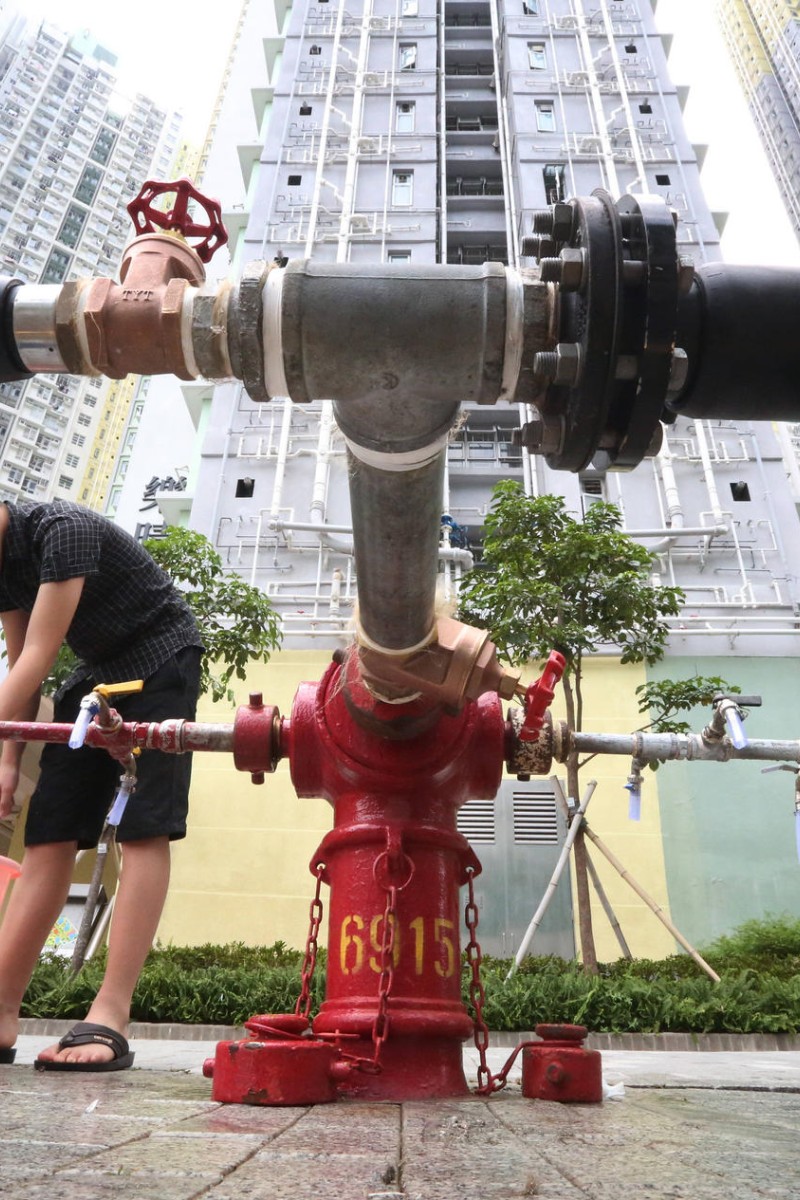 Emergency "lead-free" drinking water.
Emergency "lead-free" drinking water.Tainted water scare
The water scare started at Kowloon City's Kai Ching Estate, when the Democratic Party commissioned tests in June. They showed that tap water samples contained amounts of lead exceeding World Health Organisation standards.
Subsequent tests by the government showed water samples taken from a number of public housing estates also contained excessive amounts of lead. Later the lead-in-water scare spread to schools, when water samples at St Thomas' Primary School in Sham Shui Po were the first to be found to contain excessive amounts of lead in August.
A commission was set up on August 13 to investigate the scandal, with Justice Andrew Chan Hing-wai as Chairman and Commissioner. Its hearing started in November and is expected to run until January. Testimony will be heard from witnesses, including contractors, health experts and Secretary for Transport and Housing, Professor Anthony Cheung Bing-leung.
HKU deputy head controversy
The University of Hong Kong's (HKU) management came under the spotlight after its governing body decided in June to defer the appointment of liberal scholar Professor Johannes Chan Man-mun as one of vice-chancellor Peter Mathieson's five deputies.
This is despite Chan being recommended by the university's select committee. Chan, who is pro-democracy, had handled the controversial donation his colleague Benny Tai Yiu-ting, an Occupy Central co-founder, received when he was the school's law dean. HKU's decision to defer the appointment triggered an outcry from students, alumni and the public.
A closed-door meeting of the HKU governing body on July 29 ended in chaos when angry students stormed the venue. A HKU council member, Dr Lo Chung-mau, collapsed in the middle of the shouting and shoving in the room.
On September 29, the council voted 12-8 to reject a recommendation that Chan should take up the post of pro-vice-chancellor in charge of academic staffing and resources.
HKU student union president Billy Fung Jing-en, who sat on the council, abandoned confidentiality rules to spill the beans on what council members and non-HKU staff had said behind closed doors. Two recordings were leaked to Commercial Radio in October revealing that council members Professor Arthur Li Kwok-cheung and Leonie Ki Man-fung had criticised Chan's academic qualifications and personal integrity. The university had asked the court for an interim order to ban further release of information about the council's closed-door meeting in September.
HKU student union leaders Coleman Li and Fung launched separate legal actions to challenge the controversial decision by HKU's ruling council not to appoint Chan.
Government refuses to renew ATV's free-to-air licence
On April 1, Hong Kong's Executive Council decided not to renew ATV's free-to-air licence which was set to expire on November 30. Commerce and Economic Development Secretary Gregory So Kam-leung, the minister in charge of broadcasting, explained that ATV had been given ample time to submit a sustainable business plan to carry on, but had failed to deliver. And there was no potential buyer with a satisfactory financial proposal. The station will be allowed to operate until April 1, 2016, as the government is required to give it a full year's notice. If ATV continues to breach broadcasting laws in the interim, its licence could be revoked altogether.
The decision came after ATV had intermittently failed to pay wages to its employees since June 2014, and the public criticised its programme quality.
MTR ban on large music instruments
In September, a schoolgirl was ejected from Tai Wai MTR Station for carrying a guzheng, or Chinese zither. A week later, a Baptist University student with a cello was refused entry at Hung Hom MTR Station. MTR's ban on large music instruments provoked public outrage, as critics see it as a double standard. Of particular concern is the East Rail, where cross-border parallel traders swarm the carriages with cartloads of goods.
On October 3, nearly 100 musicians - many of them professionals - staged a protest inside Tai Wai station in defiance of the MTR's ban. The MTR launched a trial scheme on November 2 requiring musicians to register large instruments so they can take them on the MTR.
Rejection of 2017 electoral reform package
On June 18, the Legislative Council voted 28-8 to reject the government's electoral reform plan. This came after the Beijing camp walked out in a "miscommunication", leaving only eight pro-establishment lawmakers to vote for the plan.
There was utter confusion among the government's allies when 31 of them left the chamber in the mistaken belief the ballot would be adjourned while they waited for rural kingpin Lau Wong-fat, who was stuck in traffic on his way to cast his vote. The resulting fiasco ended two years of debate over the chief executive election in 2017. The CE would now be elected by a 1,200-member election committee.
